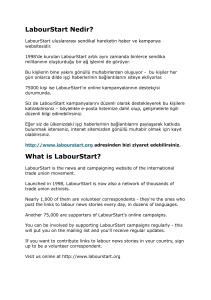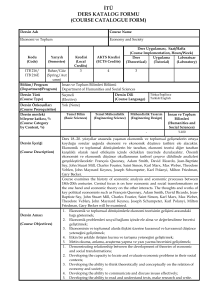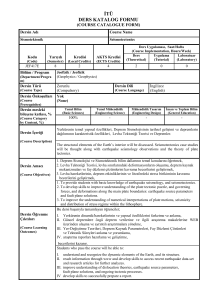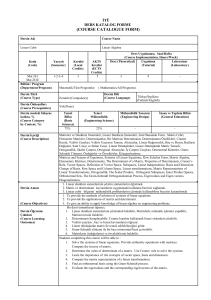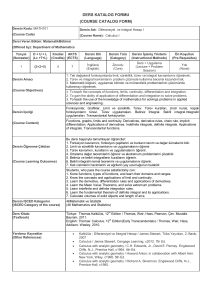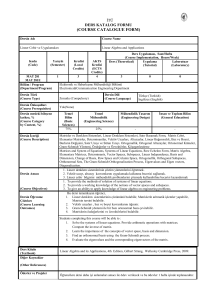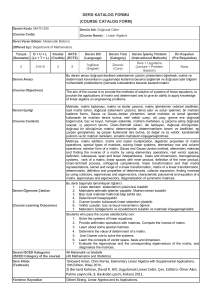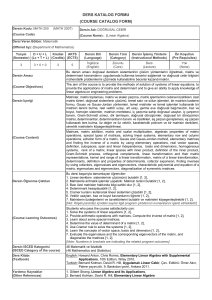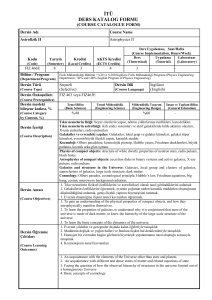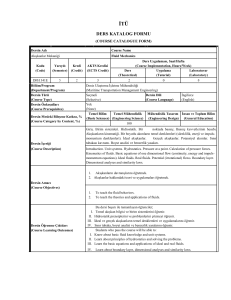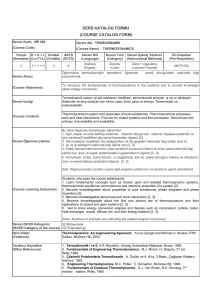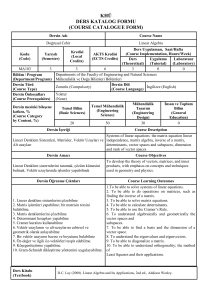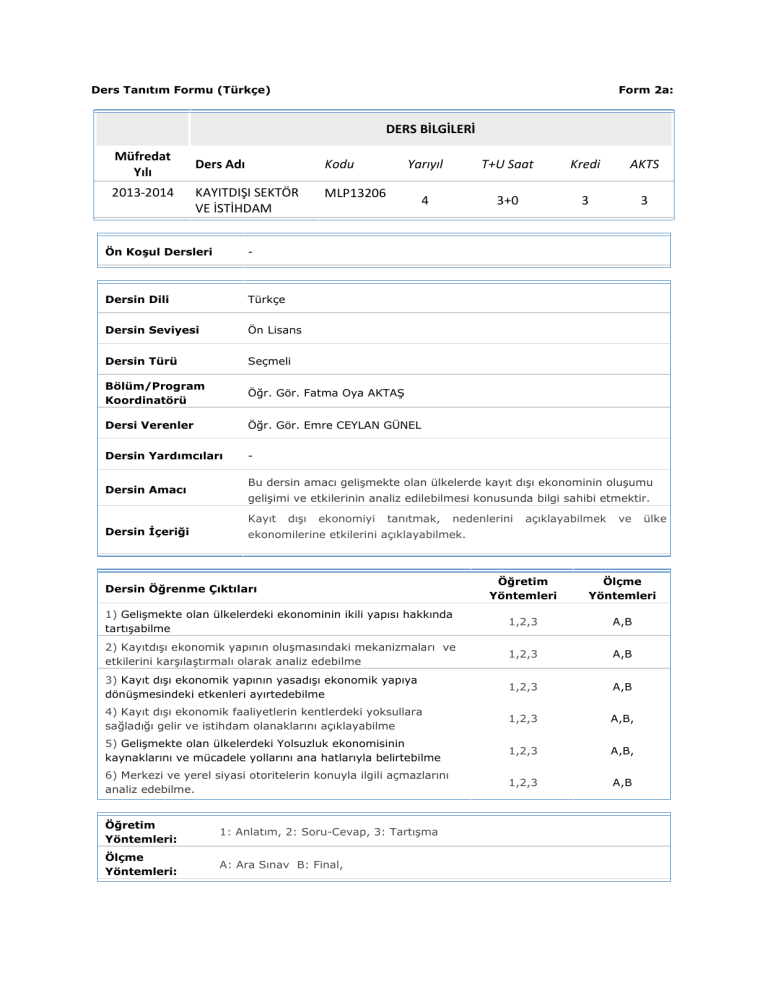
Ders Tanıtım Formu (Türkçe)
Form 2a:
DERS BİLGİLERİ
Müfredat
Yılı
2013-2014
Ders Adı
Kodu
KAYITDIŞI SEKTÖR
VE İSTİHDAM
MLP13206
Yarıyıl
T+U Saat
Kredi
AKTS
4
3+0
3
3
Ön Koşul Dersleri
-
Dersin Dili
Türkçe
Dersin Seviyesi
Ön Lisans
Dersin Türü
Seçmeli
Bölüm/Program
Koordinatörü
Öğr. Gör. Fatma Oya AKTAŞ
Dersi Verenler
Öğr. Gör. Emre CEYLAN GÜNEL
Dersin Yardımcıları
-
Dersin Amacı
Bu dersin amacı gelişmekte olan ülkelerde kayıt dışı ekonominin oluşumu
gelişimi ve etkilerinin analiz edilebilmesi konusunda bilgi sahibi etmektir.
Kayıt
Dersin İçeriği
dışı
ekonomiyi
tanıtmak,
nedenlerini
açıklayabilmek
ve
ülke
ekonomilerine etkilerini açıklayabilmek.
Öğretim
Yöntemleri
Ölçme
Yöntemleri
1) Gelişmekte olan ülkelerdeki ekonominin ikili yapısı hakkında
tartışabilme
1,2,3
A,B
2) Kayıtdışı ekonomik yapının oluşmasındaki mekanizmaları ve
etkilerini karşılaştırmalı olarak analiz edebilme
1,2,3
A,B
3) Kayıt dışı ekonomik yapının yasadışı ekonomik yapıya
dönüşmesindeki etkenleri ayırtedebilme
1,2,3
A,B
4) Kayıt dışı ekonomik faaliyetlerin kentlerdeki yoksullara
sağladığı gelir ve istihdam olanaklarını açıklayabilme
1,2,3
A,B,
5) Gelişmekte olan ülkelerdeki Yolsuzluk ekonomisinin
kaynaklarını ve mücadele yollarını ana hatlarıyla belirtebilme
1,2,3
A,B,
6) Merkezi ve yerel siyasi otoritelerin konuyla ilgili açmazlarını
analiz edebilme.
1,2,3
A,B
Dersin Öğrenme Çıktıları
Öğretim
Yöntemleri:
1: Anlatım, 2: Soru-Cevap, 3: Tartışma
Ölçme
Yöntemleri:
A: Ara Sınav B: Final,
DERS AKIŞI
Hafta Konular
1
2
3
4
5
6
7
8
9
10
11
12
13
14
15
Ekonomik Hayat – Dualizm
Dualist Yapıyı Nitelendiren terimler
Kayıt Dışı Ekonomiyi ortaya çıkaran faktörlerin analizi
Kayıt Dışı ekonominin sosyal temelleri, Kırsal üretim düzeninden kentsel
üretim düzenine
Kentle bütünleşemeyen nüfus sorunu
Kayıt dışı ekonomik yapıda enformel sektör
Formel – enformel sektör ayırımı
Enformel sektörün analizi, Enformel sektörün fonksiyonları
Ara Sınav
Kayıt dışında ekonomide tehlikeli bir boyut Yeraltı ekonomisi
Karapara ve Karapara aklama yolları
Karapara ve Uluslararası ilişkileri Mafya ve Uluslararası Terörizm
Paravan şirket, Naylon fatura ve Kayıt dışı ekonomi
Türkiye’de Kayıt dışı Ekonomik yapı
Türkiye’de Kayıt dışı Ekonomik yapı
Ön Hazırlık
Belirtilen
kitapların ilgili
bölümleri
Belirtilen
kitapların ilgili
bölümleri
Belirtilen
kitapların ilgili
bölümleri
Belirtilen
kitapların ilgili
bölümleri
Belirtilen
kitapların ilgili
bölümleri
Belirtilen
kitapların ilgili
bölümleri
Belirtilen
kitapların ilgili
bölümleri
Belirtilen
kitapların ilgili
bölümleri
Belirtilen
kitapların ilgili
bölümleri
Belirtilen
kitapların ilgili
bölümleri
Belirtilen
kitapların ilgili
bölümleri
Belirtilen
kitapların ilgili
bölümleri
Belirtilen
kitapların ilgili
bölümleri
Belirtilen
kitapların ilgili
bölümleri
Belirtilen
kitapların ilgili
bölümleri
KAYNAKLAR
Ders Notu
Diğer Kaynaklar
SUGÖZÜ Halil İbrahim, Kayıtdışı Ekonomi ve Türkiye, Nobel Yayın,2012
ÖZSOYLU Ahmet Fazıl, Türkiye’de Kayıtdışı Ekonomi, Bağlam Yayınları
Güncel Makale ve İnternet Kaynakları
MATERYAL PAYLAŞIMI
Dokümanlar
http://personel.kirklareli.edu.tr/emre-ceylan-gunel/
Ödevler
http://personel.kirklareli.edu.tr/emre-ceylan-gunel/
Sınavlar
http://personel.kirklareli.edu.tr/emre-ceylan-gunel/
DEĞERLENDİRME SİSTEMİ
YARIYIL İÇİ ÇALIŞMALARI
SAYISI
KATKI YÜZDESİ
Ara Sınav
1
%40
Toplam
40
Yıl içinin Başarıya Oranı
40
Finalin Başarıya Oranı
60
Toplam
100
DERS KATEGORİSİ
%100 Sosyal Bilimler
DERSİN PROGRAM ÇIKTILARINA KATKISI
No
Program Öğrenme Çıktıları
1
Gümrük Kanunu ve Gümrük Yönetmeliğini genel hatlarıyla hatırlayabilme
2
4
Dış ticarette kullanılan ulusal ve uluslararası belgeleri uygun şekilde
hazırlayabilme.
Dış ticarette uygulanan teşvik yasasını ve dış ticarette kullanılan finansman
tekniklerini tanımlayabilme.
Genel muhasebe prensiplerini dış ticaret muhasebesine aktarabilme.
5
İthalat/ihracat mevzuat ve işlemlerine yönelik bilgisayar paket programları
Katkı Düzeyi
1
3
2
3
4
5
aracılığıyla doküman hazırlayabilme.
6
Uluslararası taşımacılık ve lojistik işlemlerini organize edebilme.
7
Dış ticaret alanında matematiksel hesap yapabilme.
8
Dış Ticaret alanında İngilizce sözlü ve yazılı iletişim kurabilme.
9
Herhangi bir konuda rapor yazabilme.
10
Ulusal/uluslararası ekonomik olayları ve işletmelerin yapısını analiz
11
edebilme.
Dış ticaret işlemleri ile ilgili kişi, kurum ve kuruluşların yasal hak ve
sorumluluklarını kavrayabilme.
12
Türkiye ve dünya ekonomisindeki önemli ekonomik sorunları ve uygulanan
13
iktisat politikalarını açıklayabilme.
Avrupa Birliği’nin uluslararası siyasete ve Türkiye’ye etkilerini analiz
edebilme.
14
Bölgesel kuruluşlar, Avrupa Birliği ve Gümrük Birliği’ni Türkiye’yle
X
X
ilişkilendirebilme.
15
Atatürk İlke ve İnkılaplarını sıralayabilme.
16
Türkçe sözlü ve yazılı iletişim kurabilme.
AKTS / İŞ YÜKÜ TABLOSU
SAYISI
Süresi
(Saat)
Toplam
İş Yükü
(Saat)
Ders Süresi (Sınav haftası dahildir: 15x toplam ders saati)
15
3
45
Sınıf Dışı Ders Çalışma Süresi(Ön çalışma, pekiştirme)
15
2
30
Ara Sınav
1
5
5
Kısa Sınav
1
3
3
Ödev(ler)/Seminer(ler)
1
3
3
Uygulama (Lab., Atölye, Arazi,… Raporları)
-
-
-
1
7
7
Etkinlik
Diğer (………………………………………………………….)
Yarıyıl sonu sınavı
Toplam İş Yükü
Toplam İş Yükü / 30 (s)
Dersin AKTS Kredisi
93
3.10
3
Course Introduction Form (İngilizce)
Form 2b:
Course Information
Year of
Curriculum
2013-2014
Course Title
Code
INFORMAL SECTOR
MLP13206
AND EMPLOYMENT
Prerequisites
-
Language of
Instruction
Turkish
Course Level
Associate's Degree
Course Type
Elective
Semester
L+P Hour
Credits
ECTS
4
3+0
3
3
Department/Program
Lec. Fatma Oya AKTAŞ
Coordinator
Instructors
Lec. Emre CEYLAN GÜNEL
Assistants
-
Goals
Content
To inform about the formation of the informal economy in developing
countries
Informal economy promote, explain the reasons for and explain the effects
of economies
Teaching
Methods
Assessment
Methods
1) Will be able to discuss about the dual nature of the economy
in developing countries.
1,2,3
A,B
2) Will be able to analyzes the informal economic structure and
the effects.
1,2,3
A,B
1,2,3
A,B
1,2,3
A,B,
5) Will be able to specify ways to combat resources of corruption
economic in developing countries.
1,2,3
A,B,
6) Will be able to analyzes the dilemmas of central and local
political authorities on the subject.
1,2,3
A,B
Learning Outcomes
3) Will be able to distinguish between the informal economic
structure and transformation factors on the illegal economic
structure
4) Will be able to explain how informal economic activities
creates employment opportunities and income for the poor
people.
Teaching
Methods:
1: Narration, 2: Question-Answer, 3: Discussion
Assessment
Methods:
A: Midterm , B: Final
COURSE CONTENT
Week Topics
1
2
3
4
5
6
7
8
9
10
11
Study Materials
Economic Life – Dualism
Relevant parts of
Specified books
Describing the structure terms of Dualisy
Relevant parts of
Specified books
Unregistered Economy revealing analysis of the factors
Relevant parts of
Specified books
Social foundations of the informal economy, the rural urban production to
Relevant parts of
urban production order.
Specified books
The integration problems urban population.
Relevant parts of
Specified books
The informal sector in unregistered economic structure.
Relevant parts of
Specified books
The unregistered informal sector in economic structure
Relevant parts of
Specified books
Differentiation of formal and informal sector
Relevant parts of
Specified books
Midterm Exam
Relevant parts of
Specified books
Dangerous dimension to the informal economy; The underground
economy
Black money and black money laundering routes
12
Black money and the International Relations. Mafia and International
Terrorism
13
Shell corporation Paravan company, fake invoice Nylon invoice and the
informal economy
14
15
Relevant parts of
Specified books
Relevant parts of
Specified books
Relevant parts of
Specified books
Relevant parts of
Specified books
The informal economic structure in Turkey
Relevant parts of
Specified books
The informal economic structure in Turkey
Relevant parts of
Specified books
RECOMMENDED SOURCES
SUGÖZÜ Halil İbrahim, The Informal Economy And Turkey, Nobel
Publications,2012
ÖZSOYLU Ahmet Fazıl, Informal Economy İn Turkey, Bağlam Publıcatıons
Textbook
Additional Resources
Updated Articles and Online Resources
MATERIAL SHARING
Documents
http://personel.kirklareli.edu.tr/emre-ceylan-gunel/
Assignments
http://personel.kirklareli.edu.tr/emre-ceylan-gunel/
Exams
http://personel.kirklareli.edu.tr/emre-ceylan-gunel/
ASSESSMENT
IN-TERM STUDIES
QUANTITY
Mid-terms
PERCENTAGE
1
Total
%40
1
40
Contribution of in-term studies to overall grade
40
Contribution of final examinatıon to overall grade
60
Total
100
COURSE CATEGORY
100% Social Science
COURSE'S CONTRIBUTION TO PROGRAM
N
o
Program Learning Outcomes
1
Students will be able to recall custom laws and custom codes in general
terms.
2
Students will be able to prepare national and international documents
used in foreign trade properly.
3
Students will be able to define the promotion law and financing
techniques used in foreign trade.
4
Students will be able to relate the principles of general accounting to
foreign trade accounting.
Contribution
1
2
3
4
5
5
Students will be able to prepare documents related to import-export
regulations and transactions using computer package programs.
6
Students will be able to organize international transport and logistics
transactions.
7
Students will be able to make mathematical calculations used in the
foreign trade sector.
8
Students will be able to communicate in English orally and in writing in
the foreign trade sector.
9
Students will be able to write reports in any topic.
1
0
Students will be able to analyze the structure of businesses and
national/international economic events.
1
1
Students will be able to recognize the legal rights and responsibilities of
individuals, institutions and organizations which are related to foreign
trade.
1
2
Students will be able to interpret economic problems and economic
policies carried out in Turkey and in the global economy.
1
3
Students will be able to analyze the effects of the European Union on
international politics and Turkey.
1
4
Students will be able to relate the Customs Union, regional
organizations (especially the European Union) to Turkey.
1
5
1
6
Students will be able to name Ataturk's Principles and Revolutions.
X
X
Students will be able to communicate in the Turkish Language.
ECTS ALLOCATED BASED ON STUDENT WORKLOAD BY THE COURSE DESCRIPTION
Quantity
Duration
(Hour)
Total
Workload
(Hour)
Course Duration (Including the exam week: 15x Total course hours)
15
3
45
Hours for off-the-classroom study (Pre-study, practice)
15
2
30
Mid-terms
1
5
5
Quiz
1
3
3
Homework(s)/Seminar(s)
1
3
3
Practice (Lab., Workshop, Area,… Reports)
-
-
-
Others (………………………………………………………………)
-
-
-
Final examination
1
7
7
Activities
Total Work Load
93
Total Work Load / 30 (h)
3.10
ECTS Credit of the Course
3

